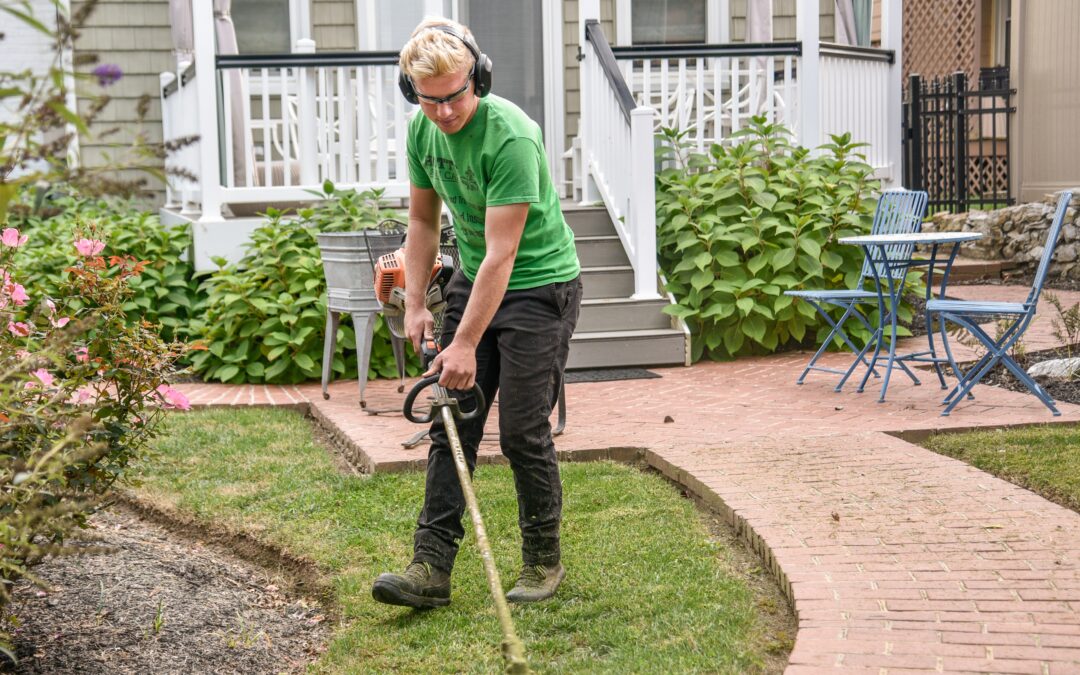If you have a green thumb and a knack for design, you may have considered starting a landscape business. This rewarding venture can provide lots of revenue if done right. How do you approach something as major as establishing a business? What are the steps you need to take to ensure your success?
MowTown Blades created a guide to help you. We’ve included the best practices and some solid steps to take to get your business up and running. Keep reading to learn more! In this article, you will learn about:
- Research and Planning
- Legal Structure and Registration
- Insurance
- Forming Your Team
- Marketing and Branding
- Finding the Right Equipment and Supplies
- FAQs
Research and Planning
The first step for starting a business is research and planning. You need to know what to expect, what needs to be addressed, and what risks you might face as you begin your landscaping business. What do you need to know about the landscaping industry? Here are some aspects you should consider in the planning and research stage.
Determining the Type of Services You’ll Offer
Anyone with a lawn can request landscaping services. However, you may not have the initial skills and resources for more complex properties. It’s important to know your limitations and your areas of expertise. This information will help you determine the kind of services you offer. You can start with basic and general landscaping services, then add more specialized work as you grow.
- Xeriscaping: Use of drought-tolerant plants and water-conserving designs, reducing the need for irrigation.
- Sustainable Landscaping: Designs and methods that help reduce waste and conserve water.
- Hardscaping: Specialty services involving pavement, pathways, fountains, and other features that use concrete or stone.
- Seasonal Care and Maintenance: Dynamic landscaping service that changes depending on the season.
- Commercial Landscaping: Used for non-residential facilities and establishments.
Focusing on a Target Audience
Business owners should focus on a specific target audience. You can target an audience by creating a client persona. With this tactic, you can spend your resources on an audience that’s more likely to patronize your business. Ask yourself the following questions to determine your client persona:
- Do my clients prefer luxury or budget-friendly services?
- Are my clients looking for residential or commercial landscaping?
- What is the income range of my preferred clients?
- Are my clients located in suburban, urban, or rural areas?
Understanding Your Competition
You can gain an edge over other landscaping businesses by knowing what they are doing. You want to avoid their weaknesses and match their strengths, so make sure to scope out the competition. Check out their client reviews and feedback. Identify their top services and learn why these are in demand among clients. With this information, you’ll be able to make informed decisions in your business plan.
Legal Structure and Registration
Depending on the type of business you have, you may enjoy certain perks or face a few challenges, so it’s important to consider the legal structure of your landscaping business. Some of the more common structures are sole proprietorships, limited liability companies (LLCs), and corporations. LLCs and sole proprietorships are for small businesses, and corporations are for larger entities. Landscaping businesses usually follow the former. The entity you choose can have an impact on your taxes as well. Be sure to involve a CPA in your decision-making process.
Each type of legal structure has its own set of requirements. Make sure that you can obtain the necessary permits and licenses during registration, so you can avoid any legal problems. You may also consult with a lawyer for a more hassle-free process.
Insurance
Insurance policies serve as protection against the unexpected. For example, you could experience theft or face a personal injury claim from an injured worker. A comprehensive insurance plan can provide compensation. Since the policy will cover the costs, you won’t face financial loss. Here are some examples of policies you should get.
Workers’ Compensation
All states except Texas require workers’ compensation insurance. This policy provides coverage for employees who get sick or injured at work. Since landscaping involves lots of physical work, this coverage is essential. Nearly every state has made it illegal to not have worker’s compensation insurance.
Liability Insurance
Liability insurance gives you protection against claims from another party. Since landscaping work involves heavy equipment, injuries can occur. This coverage provides compensation to claimants for medical expenses and legal fees. Liability insurance can also protect you from potential settlements.
Commercial Vehicle Insurance
Many areas require commercial vehicle insurance. This policy offers protection for assets like your fleet in case of accidents or theft. In addition, the policy may have liability coverage. This is applicable for property damage or bodily injury caused by your employees while they’re on the road to landscaping projects.
Forming Your Team
Landscaping is seldom a single man job, so you’ll need a reliable team. How do you choose the right people? What are the qualifications needed? Here are a few things to consider when you’re creating your crew.
- Experience: You’ll want someone who already has experience in landscaping. You can hire someone without experience, but they will need additional training. Instead, opt for those who already know about the business. They’re likely aware of the basics, best practices, and safety measures.
- Physical Fitness: Landscaping will involve a lot of manual work. Digging holes and lifting materials is physically demanding, so hire someone who has the physicality for it. They should also be comfortable working outside. Rain, sun, and snow are expected in this line of work.
- Knowledge of Plants: A landscaping employee should have botanical knowledge. Vegetation is a critical aspect of most designs. Knowing this, you should hire workers who know about different plant types. Employees should also be aware of the type of plants used, growth requirements, and care.
- Team Player: Landscaping projects will require collaboration. Make sure to hire an employee who knows how to work with others. They should know how to communicate properly and minimize problems. You can ensure harmonious and efficient operations by hiring employees that work well on a team.
Marketing and Branding
These two concepts overlap, but they are distinct. Marketing is building awareness about your landscaping business, and branding is your identity. However, both contribute to how your target audience perceives your business. You can stand out with engaging marketing and branding strategies. Here are four tips to follow.
- Use a Memorable and Cohesive Branding: Have consistent colors, logos, and other graphic elements. These will help create an impression on your target audience. During planning, establish the tone of your brand. Will it be humorous, formal, or conversational? Whichever you choose, make sure it’s consistent across all platforms and channels.
- Create an Online Presence: Most people use the internet to find services nowadays. Make sure you have a website that’s search engine optimized. Social media pages are also ideal for communicating with clients and showing off your projects. Most are free and have tools for business owners.
- Advertise as Needed: Traditional and digital advertising will help you boost visibility. You can begin by posting posters in your local neighborhood. PPC ads are also ideal for smaller marketing budgets. You can Geo-target these ads to only appear in your city or community.
- Take Advantage of Online Listings: Make sure to include your business on websites like Angie’s List, Home Advisor, or Google Business. Many people come to these directories, so you decrease your visibility by deciding not to be on these sites. Add your business contact details, address, and other information to your listings. That way, customers can reach out easily.
Finding the Right Equipment and Supplies
If you have the right supplies and tools, you can achieve high-quality results. Before buying anything, make sure that you get only equipment that fits the services you offer. In addition, be mindful of your budget to avoid overspending. Here is the basic equipment you will need.
- Landscaping Materials: Mulch, soil, and gravel are examples of these materials. Partner with a trusted supplier to provide these items. You may even be able to secure a landscaper discount with local suppliers.
- Plants and Vegetation: From grass to shrubbery, most landscaping designs will involve plants. You can work with local nurseries and gardens for a steady local supply of seedlings and vegetation.
- Gardening Tools: Find a reliable supplier of gardening and landscaping essentials. They should be able to supply items like wheelbarrows, shovels, rakes, etc.
- Safety Gear: To reduce the risk of injury, equip your team with personal protective equipment. Make sure to purchase gloves, safety glasses, steel-toed boots, and others.
- Lawn Care and Maintenance: Lawn maintenance will take up the bulk of your work. For hassle-free lawn care, find a good source of quality lawn mower blades. There are companies like us that sell in bulk. These blades are high-quality, too. You won’t need to replace them often, leading to more savings.
Transportation: You will need trucks and vans to transport your team and equipment. Make sure that your fleet is also properly maintained during operation for longevity. You may have additional costs to wrap your vehicles with marketing, which will help you build a brand over time as your vehicles travel the area.
Final Thoughts on Starting a Landscape Business
There are plenty of things to consider before establishing a local landscaping company. Make sure to follow the tips and advice we shared above to get started. With the right planning and research, you’ll be well on your way to securing your first client.
FAQs
How Should I Price My Landscaping Services?
It depends on various factors, such as the scope of the project, material costs, and labor. You can check out the rates of competitors as a baseline.
How Much Capital Do I Need When Starting a Landscape Business?
The funding you’ll need will depend on several factors, such as the scale of your operations and equipment needed. You can get a more accurate estimate through a detailed business plan. You can also look into purchasing a landscaping franchise.
How Can I Attract More Clients for My Landscaping Business?
Make use of all marketing platforms and channels, such as social media and email. You can also ask your previous clients to leave reviews and refer your business to others. Through word of mouth and positive testimonials, you can build a good reputation and attract more clients.

